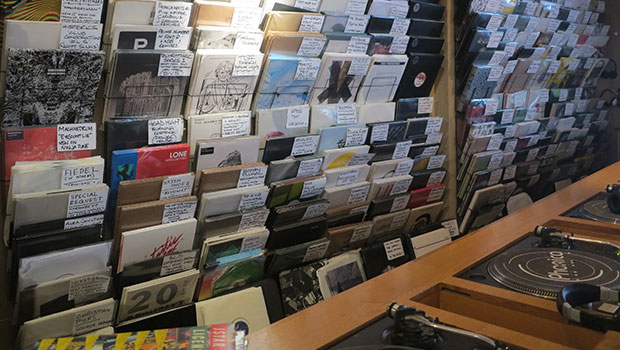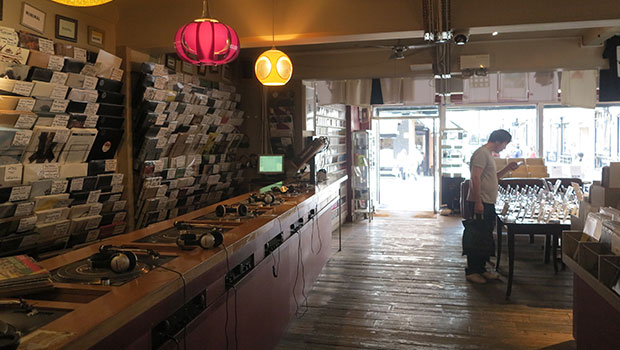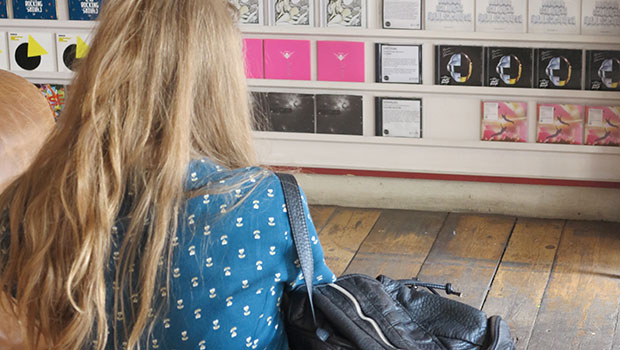Abbiamo incontrato il gentilissimo titolare di Phonica, Simon Rigg, per una breve chiacchierata sul negozio di dischi più importante di Londra. Un vero e proprio tempio per la musica elettronica mondiale. Il meglio della musica di genere passa da qui, dove viene scelta, ascoltata, giudicata e venduta ai migliori dj in circolazione. Non solo negozio, ma anche etichetta, luogo di incontri, luogo di scambi di idee e luogo per numerose feste (spesso il venerdì fanno dj set intorno alle sei, per un paio di ore).
Caro Simon, prego presentati e raccontaci da quanto lavori per Phonica.
Mi chiamo Simon Rigg e sono il manager di Phonica da quando abbiamo aperto nel 2003, stiamo giusto per celebrare i dieci anni di attività questo Ottobre.
Phonica è ormai un’istituzione nel circuito cittadino e non, come è nata l’idea di Phonica?
Ho incontrato il proprietario di Vinyl Factory, uno degli ultimi produttori di vinili di tutta l’Inghilterra, il quale voleva aprire un negozio che vendesse soltanto vinili, ai tempi stavo lavorando in un’altro posto chiamato Koobla, ma insieme ad Heidi – la dj – ed un altro ragazzo chiamato Tom Relleen abbiamo lasciato per aprire Phonica. L’etichetta discografica è venuta pochi anni dopo, nel 2009, con un brano di uno di noi, Hector, il quale ora suona dappertutto con Loco Dice!
Il tuo negozio è così importante che tu sicuramente avrai visto passarti sotto gli occhi tutte le mode degli ultimi anni, tra le quali questo ritorno al vinile…
Non mi piace dire che stiamo assistendo al “ritorno” del vinile – questo è più che altro un trend inventato dai media, più che ritorno direi che stiamo assistendo ad un processo che vede la scomparsa del vinile rallentarsi, un processo che non vuole far scomparire il vinile come supporto fisico, a differenza di altri supporti ormai scomparsi, come le cassette (in parte però bisogna dire che le cassette stanno tornando prepotentemente in auge NdLorenzo). La gente ama il vinile, ama la qualità del suono prodotto dal vinile, le copertine, il fatto che lo si possa tenere in mano, il rituale e la cerimonia della puntina – questo è il motivo per cui il vinile non scomparirà mai e verrà sempre considerato come prezioso.
Quanti di voi sono anche dj? Tu Simon sei un dj? Organizzate feste in giro per la città e in negozio?
Si, come ho detto prima siamo tutti dj in negozio… anche io lo sono, sebbene non lo stia più facendo molto, ho suonato al Fabric, al The End e in diversi altri club di Londra e Berlino – Phonica è resident al Weekend, al Watergate e al Nitsa di Barcellona. Le nostre serate qui a Londra erano piuttosto leggendarie al T Bar (ora si chiama Duke’s, si trova in Aldgate), il quale ha chiuso i battenti un paio di anni fa, per cui ora ci siamo spostati al Dance Tunnel (forse attualmente il migliore locale underground della città). Faremo la festa per il decimo anno di attività ad ottobre al Fabric!

Ok, parliamo di internet e di come abbia cambiato la musica: cos’era meglio e cosa peggio prima della rivoluzione digitale? Cosa ti manca di quei tempi in cui non esistevano social network, downloads e cosa non ti manca proprio?
Non è che fosse meglio o peggio, era soltanto completamente diverso. Certo, ora è assolutamente più facile fare il mio lavoro, e acquistare dischi è più facile per un cliente che può ascoltare tutto quello che vuole senza neanche recarsi fisicamente in negozio. Anni fa, se perdevi un’uscita di un vinile, eri spacciato, non avresti potuto ritrovarla in nessun modo, viceversa ora puoi grazie a Discogs, ai negozi di seconda mano… Va detto che però prima c’erano molti più negozi indipendenti che costruivano nel corso del tempo quel passaparola che ora non esiste più, ora è tutto molto più immediato.
Una domanda più tecnica ora: come scegli un’etichetta? Come funziona? Hai dei distributori o le scegli tu una per una?
Entrambi, sia da distributori che singolarmente dalle etichette – cioè a noi vengono offerti nuovi dischi dai distributori ogni settimana, su questa base noi scegliamo cosa tenere e cosa raccomandiamo come Phonica. Ci sono dischi che vendono bene solo qui in negozio o altri dischi che magari vendono benissimo in altri negozi e male in Phonica – abbiamo notato ad esempio che molti nomi famosi non vendono niente in vinile qui in negozio, mentre potrebbero magari fare 1000 download online… Per quanto ci riguarda Levon Vincent è forse quello che vende di più, la Firecracker Records, Omar S, la nostra etichetta, Villalobos, gli edit disco, Chicago/Detroit Records.
Esiste una regola di popolarità? Cos’è che rende un disco cool? L’etichetta? Quando un disco, un’etichetta inizia a diventare alla moda, qual è il vostro ruolo nel processo? Personalmente scegliete di “spingere” un disco piuttosto che un’altro, o applicate lo stesso metodo a tutto ciò che vendete?
Bè, ho parzialmente risposto a questa domanda di già, ma comunque sì, “spingiamo” i dischi che ci piacciono così come le etichette che preferiamo, ciò nonostante ci sono etichette o dischi che non amiamo particolarmente ma che comunque vendiamo. Siamo però abbastanza in negozio, tutti con gusti diversi, per cui amiamo e supportiamo diversi brani ed etichette.
English Version:
We met the lovely Simon Rigg, manager of Phonica, the coolest and most important record shop in London. Phonica is a real institution in the field, famous between djs, promoters, radio and whatever and it is where you can find all the electronic music you are looking for. Here records and labels are chosen, reviewed and pushed, and take my words: if you are good enough to be liked by these guys, it all done! Phonica is not only a shop, it is also a popular label, a place to be and a place of many parties (often you can see parties with djs playing in the shop).
Please, Introduce yourself, and tell us for how long have you been working for Phonica.
My name is Simon Rigg and i have been the manager of Phonica since we opened in 2003. We are just about to celebrate 10 years of the shop in October.
Can you tell us the history of your shop in few sentences? Why the name? Are you also a label?
I met the owners of the Vinyl Factory who is one of the last existing pressing plants for vinyl in the UK and they wanted to open a shop that sold vinyl. i was working for another shop before called Koobla but i left that with Heidi , the DJ and another guy called Tom Relleen and we left to open Phonica. We started the label a few years later in 2009 with a track from a staff member Hector who now djs with Loco Dice everywhere!
Of course you’ve been seeing all the trends passing by since the last years, including this return to the vinyl. In your opinion, why are we seeing this revival of the vinyl in this downloading era?
There is now return to vinyl – this is just a trend picked up by the media, its more a slowing down of the demise of vinyl and its refusal to die like a lot of other older, defunct formats such as the cassette. People love vinyl, they love the sound quality, the artwork, its tangible nature, the ritual and ceremony of putting the needle on the record – this is why vinyl will never die but will be treasured. No-one gets too excited about MP3s or the act of buying / choosing mp3s from websites.
How many of you guys are djs? Are you? And do you organize parties? Have you organized parties in the past?
yes, id say everyone in the shop is a dj… myself included, although i dj far less now than i used to, playing at Fabric, The End and various clubs in London or in Berlin, Phonica had residencies at Weekend, Watergate and at Nitsa in Barcelona. Our own nights here were pretty legendary at the old T Bar but then that closed down a few years ago so now we have a bi-monthly at Dance Tunnel. We will be celebrating our 10th Anniversary in October with a big party at Fabric!
Ok, let’s talk about internet and the music business: what was better before the web revolution and what was worst before the web revolution? What are you missing of those time in which there were no social networks and downloading, and what are you not missing?
It wasnt better or worse – it was completely different. Of course, now its much easier to do my job and to buy records for the shop and its much easier for the customer who can hear everything in full without even going into the shop. Years ago, if you missed buying a record – you would never be able to get it again or even hear it again but now of course, you can and with Discogs and the like, its very easier to buy what you want, despite prohibitive prices of second-hand records. However, before , there were a lot more underground records which built up over time and they ‘spread’ by word of mouth…now it is very instant!
A technical question: how do you choose the labels you sell, how it works? Do you have suppliers or do you look for singular labels?
We buy from both suppliers and labels themselves – so we are offered new records from the suppliers on a weekly basis and we can choose what we would like to stock and also which ones we will feature and choose as records that are Phonica recommendations. There are records that do well here in the shop…and maybe some other records might sell elsewhere but badly here – we find that a lot of popular names don’t sell well on vinyl at all… even though they might sell 1000s of downloads… Levon Vincent is probably our biggest seller, Firecracker records, Omar S, our own label, Villalobos, disco edits, Chicago / Detroit Records.
Is their a rule of popularity when it comes to records? What sees hype around a record, or for that matter a label? When records/labels start to get hyped what is your role in that process? Do you personally push records you like more, or do you apply the same method to all of the records you sell?
See above and of course, we push the records we love and the records we believe in and of course, there are some that we don’t like as much but will sell anyway. There are quite a few staff here with different taste so between us all, we like different things and push different tracks.




